![]() Bobby Bare started his career with a real bang, hitting the charts with some teen-oriented folk'n'pop-tinged singles, then made his way into the Nashville mainstream, whereupon he became known as one of country music's biggest party-animal ne'er-do-wells. Bare courted his "outlaw" image, backing it up with one solid album after another. He was also one of the major interpreter of author/songwriter Shel Silverstein's work, recording several records that could be considered Silverstein "tribute" albums. Here's a quick look at the Bare essentials... (Sorry... couldn't resist that last one!)
Bobby Bare started his career with a real bang, hitting the charts with some teen-oriented folk'n'pop-tinged singles, then made his way into the Nashville mainstream, whereupon he became known as one of country music's biggest party-animal ne'er-do-wells. Bare courted his "outlaw" image, backing it up with one solid album after another. He was also one of the major interpreter of author/songwriter Shel Silverstein's work, recording several records that could be considered Silverstein "tribute" albums. Here's a quick look at the Bare essentials... (Sorry... couldn't resist that last one!)
Bobby Bare "Detroit City" (RCA Victor, 1963)
Bobby Bare "500 Miles Away From Home" (RCA Victor, 1963)
Bobby Bare "Travelin' Bare" (RCA Victor, 1964)
Bobby Bare & Skeeter Davis "Tunes For Two" (RCA Victor, 1965)
Pretty wimpy. At the time, Bobby Bare was still being cast as a Nashville pop-folkie, sort of one step away from a teenpop singer. Skeeter Davis was in a similar bag, but without the leaden "folk" trappings; neither one of them sound particularly thrilled about having been drafted for this project. Pairing them up like this was a lamentable choice, especially with such slow, slow arrangements -- did someone at RCA canteen forget to buy the coffee that week? Lots of goofy recitations, too. I wouldn't exactly send you off scouring the used record bins of the world looking for this one, though there are a few okay numbers on here that don't ever make it onto the best-of collections -- their harmonies on the Everly Brothers classic, "Let It Be Me," and Buck Owens' "Together Again" are about as heartfelt as this snoozer gets. Still, a remake of "Dear John Letter" almost hit the Top Ten.
Bobby Bare "Constant Sorrow" (RCA Victor, 1965)
Bobby Bare "Talk Me Some Sense" (RCA Victor, 1966)
Bobby Bare "The Streets Of Baltimore" (RCA Victor, 1966)
Bobby Bare "This I Believe" (RCA Victor, 1966)
A gospel offering, with classics such as "Just A Closer Walk With Thee," "I'll Fly Away" and "The Family Bible," along with some newer tunes...
 Norma Jean/Bobby Bare/Liz Anderson "The Game Of Triangles" (RCA Victor, 1967) (LP)
Norma Jean/Bobby Bare/Liz Anderson "The Game Of Triangles" (RCA Victor, 1967) (LP)
An oddly-assembled, but still quite pleasant album featuring several three-way collaborations between these RCA second-stringers, as well as a solo tune or two apiece. Anderson's material is most striking (although often quite hokey); at the time Bare was still stuck in the post-teen idol, sort-of folkie persona that the label had cast him in. Not a mind-blowing album, and quite a concept album, but it's got some nice stuff on it.
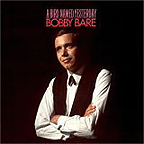 Bobby Bare "A Bird Named Yesterday" (RCA Victor, 1967)
Bobby Bare "A Bird Named Yesterday" (RCA Victor, 1967)
Bobby Bare/The Hillsiders "The English Countryside" (RCA Victor, 1967)
Bobby Bare "Margie's At The Lincoln Park Inn" (RCA Victor, 1969) (LP)
(Produced by Chet Atkins & Danny Davis)
On the surface, musically, this seems like more of the same folk-country-with-strings material that had defined Bare's early career, but thematically this is a pretty subversive album. Starting with the title track, with this more or less a concept album about morality and hypocrisy in the straights-vs-hippies era of the late '60s, with songs about prostitutes, cheats, drunkards and hippies all of who are condemned by a society that's equally fallen and flawed. Some of the tracks were moralizing country standards, like "Skip A Rope" or "Ruby Don't Take Your Love To Town," and others take on added bite when placed in the context of an entire album. A couple of songs -- Kris Kristofferson's "The Law Is For Protection Of The People" and "If There's Not A Hell (There Ought To Be)" are explicitly countercultural, calling people out on issues such as police brutality and the Vietnam war. It's actually pretty amazing he got away with recording an album like this, but I guess that's a measure of how politicized America had become, even in Nashville.
Bobby Bare "Your Husband, My Wife" (RCA Victor, 1970)
Bobby Bare "This Is Bare Country" (Mercury Records, 1970)
A fairly lethargic album, with Bare still mining the loping folk-country sound, and only a few hints of the bad-boy outlaw sound he'd later embrace. This opens with one of his classics, "How I Got To Memphis," but is packed with less-distinguished material. Standout tracks include "Come Sundown," and -- to a lesser extent -- the sunshine country of Joe South's "Don't It Make You Want To Go Home," which at least has a little bit of a backbeat. Not a great record, but okay in small doses.
Bobby Bare "Where Have All The Season's Gone" (Mercury Records, 1971)
Bobby Bare "I Need Some Good News Bad" (Mercury Records, 1971)
Bobby Bare "What Am I Gonna Do?" (Mercury Records, 1972)
Bobby Bare "High And Dry" (Mercury Records, 1979)
Bobby Bare "I Hate Goodbyes/Ride 'Em Down Easy" (RCA Victor, 1973)
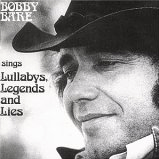 Bobby Bare "Lullabyes, Legends & Lies" (RCA, 1973)
Bobby Bare "Lullabyes, Legends & Lies" (RCA, 1973)
With his return to RCA, Bare found new creative energy as an interpreter of songwriter/humorist Shel Silverstein's work... This concept album, originally a double-LP set, is one of Bare's best and is composed entirely of Shel Silverstein songs, including hits such as "Marie Laveau" and "The Winner," as well as the more lamentable "Daddy, What If..." which introduced the world to the aw, ain't dat cute-ness of Bobby Bare, Jr.
![]() Bobby Bare "Bobby Bare Sings Lullabys, Legends And Lies" (Expanded Edition) (Sony-BMG Legacy, 1973/2007)
Bobby Bare "Bobby Bare Sings Lullabys, Legends And Lies" (Expanded Edition) (Sony-BMG Legacy, 1973/2007)
Writer Shel Silverstein had several high-profile admirers in Nashville, notably Johnny Cash, who struck gold with "A Boy Named Sue," as well as Waylon Jennings and Bobby Bare, who each recorded about a bazillion of his songs. In 1973, the boozy, laconic Bare commissioned Silverstein to write an LP's worth of songs for what would become Lullabys, Legends And Lies, a concept album on RCA that yielded two chart-topping hits ("Marie Laveaux" and "Daddy, What If," a saccharine duet with his son, Bobby Bare, Jr.) and put Bare's then-floundering career back on an even keel. Silverstein and Bare's partnership continued for years, and this deluxe, 2-CD reissue includes not just the Lullabys album, but over a dozen other tracks recorded in the decade that followed. The collection is one of the finer examples of the positive side of industry consolidation, since it includes a bunch of great, wonderfully offensive novelty songs recorded in the early '80s when Bobby was on Columbia. Cheerfully obnoxious tunes like "Quaaludes Again," "Tequila Sheila" and "Numbers" are really what cemented Bare's place in the outlaw pantheon, and it's great to hear them all together, better still to have them so handily placed in context, along with a couple dozen other Silverstein chestnuts. This stuff obviously isn't for everyone, but for the right folks, this will be a goldmine. Let's hope Sony-BMG keeps up the good work with these multi-label mash-ups, 'cause discs like this show the results can be pretty cool!
Bobby Bare "Singin' In The Kitchen" (RCA Victor, 1974)
Bobby Bare "Hard Time Hungries" (RCA Victor, 1975)
Another all-Shel Silverstein outing... Includes Bare's reading of "The Giving Tree," which was a popular children's book as well. Bare's future albums all included significant amounts of Silvertein material, but this was the last all-SS outing.
Bobby Bare "Cowboys And Daddies" (RCA Victor, 1975)
Bobby Bare "The Winner And Other Losers" (RCA Victor, 1976)
Bobby Bare "Me And McDill" (RCA Victor, 1977)
A tribute to songwriter Bob McDill...
Bobby Bare "Bare" (Columbia Records, 1978)
Bobby Bare "A Sleeper Wherever I Fall" (Columbia Records, 1978)
Bobby Bare "Down And Dirty" (Columbia Records, 1980)
Bobby Bare "Drunk And Crazy" (Columbia Records, 1980)
Bare started off in the '60s as a pseudo-teenpop singer who Nashville crafted into a "profound" countrypolitan-folk balladeer, hoping to capitalize on the campus/coffeehouse folk fad. I'm not a big fan of his early stuff on RCA, but once he switched to Columbia and became a rowdy, he got really fun. Sure, he had plenty of songs with greater emotional depth, but it's silly party animal novelty tunes like "Drinkin' and Druggin' and Watchin' TV" and "Tequila Sheila" that he'll (rightfully) be remembered for. Plus, he was pretty much the official conduit for prankster Shel Silverstein's country stuff, which is nothing to sneeze at... Fun, funny, resolutely lowbrow material.
Bobby Bare "As Is" (Columbia Records, 1981)
Bobby Bare "Ain't Got Nothin' To Lose" (Columbia Records, 1982)
Bobby Bare "Drinkin' From The Bottle, Singin' From The Heart" (Columbia Records, 1983)
Old Dogs "Old Dogs" (Warner Brothers, 1998)
The Old Dogs are Bobby Bare, Waylon Jennings, Mel Tillis, and Jerry Reed...
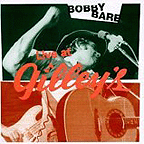 Bobby Bare "Live At Gilleys" (WEA/Atlantic Records, 1999)
Bobby Bare "Live At Gilleys" (WEA/Atlantic Records, 1999)
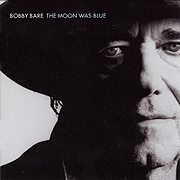 Bobby Bare "The Moon Was Blue" (Dualtone Records, 2005)
Bobby Bare "The Moon Was Blue" (Dualtone Records, 2005)
(Produced by Bobby Bare, Jr. & Mark Nevers)
Although he's best remembered as an outlaw-styled rowdy, an irascible purveyor of drinkin'an'druggin' novelty songs, hearing Bobby Bare croon oldies and standards like "Love Letters In The Sand," "It's All In The Game" and "Am I That Easy To Forget" should come as little surprise to longtime fans whose memory goes back to the early, pre-outlaw days, when Bare was still being cast as a cleancut pop-country artist. Remarkably, this is his first studio album in more than twenty years, and from all indications, it's been time well-spent. With slightly tweaked musical backing courtesy of Lambchop's Mark Nevers, Bare re-emerges as a grand old man on the country scene, infusing the doleful lyrics af every song with a sense of hard-won wisdom and world-weariness. Much like Ray Price on his recent comeback records, Bare knows how to inhabit the lyrics and he sings with a quiet, solid sense of conviction and an undeniable artistic authenticity. If you're expecting the old coot to go through the motions of telling us how he's still a wild party animal, well, forget it. This isn't that kind of a record. But if you're willing to slow down for a minute and let him bring chestnuts like "Shine On Harvest Moon," "Are You Sincere" and even "Yesterday When I Was Young" back to life, then this disc is a gem. This is a masterful, oddly moving performance, one that oughta show all them whippersnappers a thing or two about how to really sing a song.
![]() Bobby Bare "Darker Than Light" (Plowboy Records, 2012)
Bobby Bare "Darker Than Light" (Plowboy Records, 2012)
Bobby Bare "Together On One" (RCA, 1993)
A generous twofer reissue that includes material from Bare's first two LPs, 500 Miles From Home and Detroit City.
Bobby Bare "The Best Of Bobby Bare" (RCA, 1966)
Bobby Bare "The Best Of Bobby Bare, v.2" (RCA, 1967)
Bobby Bare "Folsom Prison Blues" (RCA-Camden, 1968)
Bobby Bare "This Is Bare Country Records" (RCA, 1972)
Bare's first stint of RCA was wrapped up with this belated best-of set, which included the usual hits, and a couple of new, previously unreleased tunes, "God Bless America Again" and "Have I Stayed Away Too Long," both of which were moderately successful on the charts.
Bobby Bare "For The Good Times" (Mercury Records, 1974)
Bobby Bare "16 Biggest Hits" (RCA, 1979)
A sampler of Bare's 1960s hits for RCA, from 1958-69.
Bobby Bare "Greatest Hits" (RCA, 1981)
A sampler of Bare's mid-'70s tenure on RCA, from 1973-77.
Bobby Bare "Encore" (Columbia, 1981)
A collection of hits and not-so-hits from 1978-81...
Bobby Bare "Biggest Hits" (Columbia, 1981)
A collection of hits and not-so-hits from 1978-82... Includes one new song, a cover of Rodney Crowell's " 'Til I Can Gain Control Again."
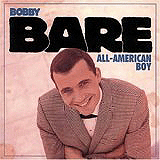 Bobby Bare "The All-American Boy" (Bear Family, 1994)
Bobby Bare "The All-American Boy" (Bear Family, 1994)
A 4-CD set covering Bare's early years on RCA... Yow!
Bobby Bare "The Mercury Years: 1970-72" (Bear Family Records, 1994)
A 3-CD set covering Bare's post-RCA work...
Bobby Bare "For The Good Times" (TKO Country, 1994)
A single CD set that gives a more compact reading of Bare's Mercury years...
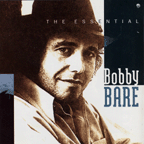 Bobby Bare "The Essential" (RCA-Nashville, 1997)
Bobby Bare "The Essential" (RCA-Nashville, 1997)
Bare started off in the '60s as a pseudo-teenpop singer who Nashville crafted into a "profound" countrypolitan-folk balladeer, hoping to capitalize on the campus/coffeehouse folk fad. I'm not a big fan of his early stuff on RCA, but once he switched to Columbia and became a rowdy, he got really fun. This disc is okay, but leans pretty heavily on Bare's early career as a pseudo-folkie, and doesn't make it into his more obnoxious but more enjoyable 'Seventies spree as a crude honkytonk humorist on the Columbia label. Sure, it's got "Dropkick Me, Jesus," but no "Tequila Sheila"... or any of his classic Shel Silverstein covers... alas! Still, for fans of his early work, hits like "Detroit City" and "500 Miles Away From Home," this set is pretty hard to beat.
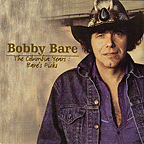 Bobby Bare "The Columbia Years: Bobby's Picks" (Edsel Records, 2000)
Bobby Bare "The Columbia Years: Bobby's Picks" (Edsel Records, 2000)
A nice import album that trawls through Bare's tenure on the Columbia label, during 1978-83. By this time, Bare was pretty strictly off the radar, creeping into the back end of the Top 40 from time to time, but just barely. Still, I think this period had a lot of his best material, although oddly enough this collection omits most of his entries into the Top 100, as well as some of his best (and raunchiest) songs. Plenty of good stuff, it's true, but after checking this out you might also want to check out some of the original albums.
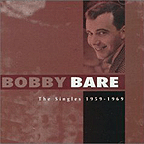 Bobby Bare "Singles: 1959-1969" (BMG International, 2001)
Bobby Bare "Singles: 1959-1969" (BMG International, 2001)
A 2-CD set with his most famous work from the pre-outlaw years...
![]() Bobby Bare "Bobby Bare Sings Shel Silverstein Plus" (Bear Family Records, 2020)
Bobby Bare "Bobby Bare Sings Shel Silverstein Plus" (Bear Family Records, 2020)
Man, leave it to Bear Family. There have been other reissues that explore the long, fertile relationship between these two country songwriting rebels -- expanded editions of various Bare-Silverstein albums, and the like. But who even suspected you could put together an entire eight CD box set of this stuff?? Now, just to be clear: I'm a fan! Not being critical at all... but you are going to want to set aside some serious listening time to get through the gems and outtakes on this puppy!
 Bobby Bare, Jr. "Young Criminal's Starvation League" (Bloodshot Records, 2002)
Bobby Bare, Jr. "Young Criminal's Starvation League" (Bloodshot Records, 2002)
Um. How to put this? Bobby Junior was last heard as a precocious pre-teen lad, asking the questions on his dad's 1974 single, "Daddy What If..." He was such a flat performer then, that even when doing a recitation bit, he sounded out of tune (!) and his voice hasn't improved much since then... He sort of lacks his dad's, um, talent and gravitas... As well as his ability to edit and concisely construct memorable songs. It's funny, also, how little he sings like his well-known (and rather distinctive) father -- the vocals on most of this album sound more like Steve Forbert than anybody else, though on the last couple of tracks Bare gets that recognizable grumble in his voice. Mellow and diffuse, this album as a whole is far too amorphous, both in the songwriting and musicianship, to make much of an impression.
Bobby Bare, Jr. "OK, I'm Sorry" (EP) (Bloodshot Records, 2003)
Back when he was but a young sprat, Bobby Jr. cut a couple of cutesy-wootsy novelty tunes with dad, where his pre-adolescent voice cracked and crinkled and sounded ever so awwwwwwww... broadcasting out on commercial country radio... It would be too much of a cheap shot to say that his voice hasn't improved much since then, but, well, it's kinda true. He's not a great singer, he tries too hard to piggyback on the rule-breaking rowdy/rebel image his dad cultivated, and his band plays rough, grungy rock, not really so much with the country. I guess some of his lyrics are interesting, but not to the extent that I personally would get too excited by his work. I'll pass.
 Bobby Bare, Jr. "From The End Of Your Leash" (Bloodshot Records, 2004)
Bobby Bare, Jr. "From The End Of Your Leash" (Bloodshot Records, 2004)
Honestly, I was surprised by the strength of some of these songs... The two opening tunes actually got me sort of tapping my toes and nodding my head... and I really hate Bobby, Jr. (At least as a performer; I'm sure he's a swell guy in real life.) So, here's the update: he still has a really crappy voice, and for the most part his lyrics are appallingly over-obvious and lame, but -- and here's the amazing part -- he is getting better. The more thoughtful musical arrangements help... this disc is way better produced than his other albums, and even has some catchy melodic touches. He is definitely not the musical genius or amazing rock'n'roll rebel his publicists make him out to be, but he may actually be turning into an interesting artist, rather than simply a pointless aural irritant. This is the first record of his that I wouldn't just tell you to avoid at all costs.

